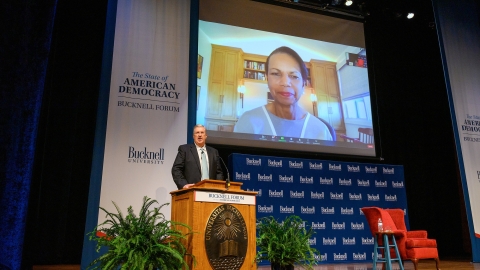
Condoleezza Rice Discusses ‘The State of American Democracy’ as Bucknell Forum Returns
September 14, 2022
President John Bravman introduces Condoleezza Rice during the Sept. 13 Bucknell Forum event. Photo by April Bartholomew
Condoleezza Rice was the national security adviser to President George W. Bush when the terrorist attacks of Sept. 11, 2001, took place. Just two days after the 21st anniversary of 9/11, Rice appeared via Zoom at Bucknell's Weis Center of the Performing Arts and told her friend and former Stanford University colleague, President John Bravman, and a captivated audience how those attacks changed American national security for good.
"What had been was a sense that security was something that you had to worry about from 'out there.' We had not had an attack on our territories since the War of 1812, and so all of our security elements and security institutions pointed outward," Rice said. "And then on September 11, we realized that there actually could be threats from inside."
Now the Tad and Dianne Taube Director of the Hoover Institution, the Denning Professor in Global Business and the Economy at the Stanford Graduate School of Business, and a professor of political science at Stanford University, Rice took part in the virtual discussion with Bravman to kick off the return of the Bucknell Forum speaker series. They spoke for just under an hour before the live audience in the Weis Center, touching on such topics as her time in the White House, the nation's political polarization, Russia's threat to the U.S., and reform of the U.S. education system, among others.
Three Reasons for Concern
The first female African American secretary of state and first woman to serve as national security adviser, Rice opened her discussion saying "the state of American democracy is not as we would like it to be." She then cited three elements that made her concerned.
"One is that Americans, of many stripes, don't see themselves any longer in our institutions. They somehow don't think that our institutions are for them," she said. "This comes from a critique from some who say those institutions were born of slavery and therefore illegitimate, and on the oher side, those that would say those institutions are elitist and don't really represent the common man. And so we've got to find a way to have Americans again be confident and respect their institutions."
Rice's second concern was that so many Americans now find "the American dream" to be a reach. She cited the state of education for the nation's poorest children as being a root cause of that deterioration.
The nation's polarization, which she called "increased tribalism," was her third reason for concern.
"There's a tendency to go to our corners — to hang out metaphorically, particularly on social media — with those who think like us, those who say what makes us comfortable. [They have] difficulty engaging with those who think differently, and when we do, we seem to get into yelling matches rather than recognize there can be different sides to an issue."
Seeing Both Sides
Rice speaks from experience when it comes to seeing both sides of the political debate. She was a Democrat until 1982, when she changed her political affiliation to Republican, in part because she disagreed with the foreign policy of President Jimmy Carter, and because of the influence of her father, who was Republican.
Ultimately she says she remains optimistic about the country's ability to resolve its current political differences.
"I am optimistic because I do believe our institutions are pretty strong," she said. "They survived a Civil War, they survived January 6 [the insurrection on the nations' Capitol Building]. I don't mind telling you I cried on that day. I thought, I don't live in a country where people do this, I study countries where people do this. And yet, throughout the system — judges and elected officials and even the vice president — stood up for the system, and that says something about the power of our norms, and that's good."
Rice was the first of five nationally renowned speakers who will discuss "The State of American Democracy" in this year's Bucknell Forum — a speaker series that since 2007 has featured national leaders, scholars and commentators who have examined various issues from multidisciplinary and diverse viewpoints. Jake Tapper — journalist, author, cartoonist and lead Washington anchor for CNN — will be the next speaker, appearing in-person on Wednesday, Nov. 30, at 7:30 p.m. in the Weis Center.

